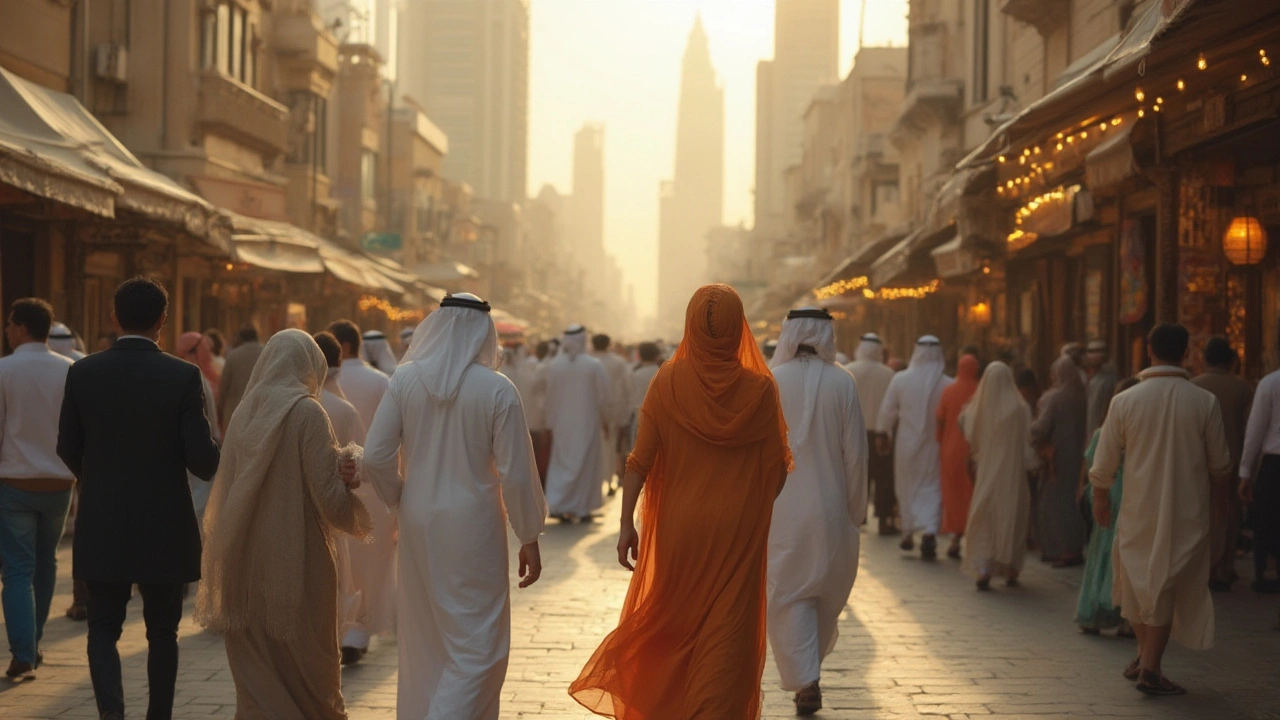
Ask people what first comes to mind when they think about Dubai and you'll get everything from gold vending machines to desert supercars. But for most visitors, the biggest surprise is just how careful you need to be about stuff that, honestly, feels totally normal back home. Dubai’s image is flashy and progressive, yet its social and legal boundaries can be much stricter than what many expect. One wrong move – an innocent kiss, a selfie in the wrong place, just wearing a tank top at the mall – and what started as the trip of a lifetime could turn into a nightmare. Here’s what people really get wrong, and what’s truly inappropriate in Dubai. Sometimes, knowing is everything.
Social Etiquette and Public Behavior: Navigating the Dos and Don’ts
Let’s tackle the big one right away: public affection. Dubai’s authorities really don’t mess around here. Even something as simple as holding hands with your partner can get you a warning – or worse – especially if you’re not married. Kissing and hugging in public? That actually counts as indecency under the law. There are stories every year, usually reported by tourists, who thought a little kiss goodbye or a stolen cuddle was romantic – until police showed up. Even friends hugging each other at a nightclub can get stares or harsh words. Locals rarely show physical affection in public, and the safest rule is to keep your hands to yourself.
Drinking alcohol is another huge area of confusion. Yes, you can drink in Dubai – but only in licensed venues. That means hotels, high-end clubs, and specific bars. Never, ever drink in public spaces (think parks, beaches, streets), and don’t walk around with alcohol. Being drunk outside those approved spots is actually a criminal offense. It sounds intense, but the city regularly detains tourists for drunken antics. More surprisingly, even being tipsy at the airport while transiting through Dubai has led to arrests. Your best bet? If you want a glass of wine, do it inside a hotel bar, and grab a taxi straight back to your room afterward.
Now, on to language and gestures. Swearing, making rude gestures, or arguing loudly can do more than sour the mood – they’re criminal offenses. Flipping someone off or shouting during a driving dispute could land you in very serious trouble. Even private messages sent online are covered by Dubai’s cybercrime laws. Sharing an obscene meme or lashing out at someone in WhatsApp can be used against you if reported. In 2023 alone, several expats faced fines and deportation over private social media comments that wouldn’t have made anyone blink in the UK or US.
Taking pictures? Easy to get this wrong too, especially if you love snapping selfies. Filming locals without permission can spark major problems, and it’s illegal to photograph government buildings, military sites, or even people in public who haven’t agreed. There have been high-profile cases of tourists facing fines for pictures that included local women in the background, simply because privacy is taken extremely seriously here.
Public displays of affection, drinking outside of licensed places, bad language, and unauthorized photos all carry legal risks. It might feel dramatic compared to other places, but Dubai doesn’t give much leeway when it comes to these boundaries. Even if a local just feels offended, that alone can be enough to call in the police. Bottom line: if you’re ever in doubt, stay on the cautious side.

Dress Code in Dubai: Subtle but Serious Rules
The dress code in Dubai is far more than a style suggestion. Sure, you’ll see locals in traditional kanduras and abayas, and tourists in shorts at the beach – but the wrong outfit in the wrong place can draw ugly stares, get you kicked out of shops, or even land you a fine. It’s all about context. Shopping malls and public areas have clear signs asking visitors to ‘dress modestly’, which means covering shoulders and knees for everyone.
If you walk into the Dubai Mall or the Metro wearing a spaghetti-strap dress or super-short shorts, there’s a high chance someone will either confront you or call mall security. Many residents – not just the authorities – will let you know if your clothes cross the line. I once saw a group of British tourists asked to leave a department store because one of them wore an off-the-shoulder top. Security didn’t shout, they simply asked them to respect the rules. The point? It isn’t optional, and it applies to guys too. No shirts off except at the pool or beach, and gym shorts don’t belong in restaurants or shopping centers.
Beachwear rules are a little different, but still strict compared to European resorts. Bikinis and swimsuits are fine at the pool or private hotel beaches, but as soon as you get up to head to the bar, you’re expected to cover up. Swimming topless – even for men in some places – isn’t allowed. Nude sunbathing? Forget it. It’s absolutely forbidden everywhere. Even the “adults-only” beach clubs enforce this strictly, and people have been fined or deported for public nudity, even by accident.
The mosque is a different world. Visiting the Grand Mosque or any religious site means women must cover their hair, arms, and legs. Mosques often lend out abayas and scarves, but wearing leggings as ‘trousers’ isn’t acceptable – your clothes must be loose and opaque. Men also have to wear long trousers and sleeves.
What about nightlife? Surprisingly, Dubai’s clubs and bars are more relaxed. High-end spots expect women to dress up, and you’ll see minidresses everywhere. But getting to and from the club still means covering up until you’re inside. Think clever: use a light jacket, or keep a long skirt in your bag for the ride. Taxis won’t let you ride with barely anything on, and you don’t want that drama after a night out.
If you want a cheat sheet for the Dubai dress code, here’s an easy guide:
- Shoulders and knees covered in public places and malls.
- Beachwear only at pools, beaches, or within beach clubs.
- No see-through, low-cut, or super tight stuff in public.
- Religious sites: Full-arm, full-leg, and (for women) hair covered.
- At nightclubs: Sexy attire okay inside, cover up for the ride there.
Staying in an AirBnB or guesthouse? Same rules. If you exit your rental, assume locals are watching, and dress accordingly. It sounds intense, but honestly, blending in and showing respect makes for a way better trip – and way fewer stares and problems. Keep it classy, and you’ll enjoy a smoother time everywhere from cafes to the gold souk.

Legal and Cultural Landmines: What Can Land You in Trouble Without Realizing
Dubai’s laws go far beyond what you wear and how you behave in public. There are lesser-known (but serious) rules that trip up visitors every year. For starters, sex outside marriage is still technically illegal. The law softened in late 2020 for foreign tourists, but it’s still risky. If the police get involved due to a complaint – maybe noise, or a simple landlord’s call – couples staying together and not married can run into major headaches. Many hotels quietly check if you are married (especially if you hold UAE or GCC passports).
Homosexuality is also still technically illegal by Dubai law. The city’s cosmopolitan image leads some to think it’s safe to be openly gay, but PDA between anyone – regardless of sexuality – is doubly risky. There aren’t rainbow bars in Dubai, and while the authorities rarely target tourists, the law itself hasn’t changed. Quiet discretion is the reality here. There are no protections for LGBT visitors, and even obscure laws about “cross-dressing” are still on the books. It’s unfair, but it’s the environment right now.
Another shocker: certain prescription drugs, including common painkillers like codeine or medications for ADHD and anxiety, are banned or tightly controlled. Arriving with meds that you picked up legally in the UK, Australia or Africa but that aren’t approved here can get you in deep trouble. Customs checks are strict. Always travel with a doctor’s letter and ideally, a UAE embassy stamp on your meds. There are horror stories every year about travelers fined or detained over simple medication mistakes.
Let’s talk money. Bouncing a cheque in Dubai is a criminal offense, not just a civil matter. Until recently, a “bounced cheque” could mean jail, and while the law softened, financial disputes often end up in court. Don’t sign or agree to anything involving large payments unless you’re certain. It also means never making a scene about money, disputing a bill in a restaurant, or shouting at staff – any argument can backfire badly.
Ramadan brings a special set of rules: no eating, drinking, or smoking in public during daylight hours, even as a tourist. Malls and hotels offer curtained-off areas for non-Muslim visitors, but the expectation is that everyone shows respect. Even chewing gum in public is frowned on. During Ramadan, noise, music, and parties are toned down everywhere. It’s a unique experience, but you don’t want to cross those boundaries – locals will speak up, and businesses enforce the silence strictly.
Finally, here’s a quick data table with things that catch first-timers off guard in Dubai – what’s allowed, what isn’t, and where you can get away with more:
| Activity | Allowed | Not Allowed | Notes |
|---|---|---|---|
| Public Affection | Married couples (mild, holding hands) | Kissing, hugging, between non-married or same-sex couples | Strictly enforced in malls, parks, and taxis |
| Alcohol | Inside licensed venues | Public places, beach, walking around intoxicated | Drunk behavior = arrest risk |
| Dress Code | Covered shoulders/knees in public | Short shorts, crop tops outside beach/club | Nightclubs = more relaxed, but change en route |
| Pictures | Selfies, city landmarks | Pics of locals/kids/buildings without consent | Never photograph Emirati women without permission |
| Prescription Drugs | With paper, UAE approval | Certain meds/without prescription | Check Dubai Health Authority website before traveling |
| Hugging (Friends) | Same gender, discreetly | Mixed gender, public hugs | Safe in private, never in public |
| Arguments/Language | Polite complaints | Shouting, swearing, rude gestures | Recorded/posted arguments carry heavy fines |
Dubai’s rules make sense with a bit of context. It’s a city blending global glitz with local values, and those cultural boundaries are everywhere, even if you can’t see them at first. Being respectful isn’t just about keeping out of trouble – it’s also the quickest way to genuinely connect with locals. The rules aren’t meant to trap you, but not following them gets noticed, and the city expects better from everyone – especially visitors. That means watching how you dress, how you act, and even what you say (or snap on your phone). No need to be paranoid, but awareness is everything here.
Dubai Escort